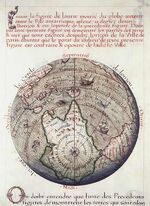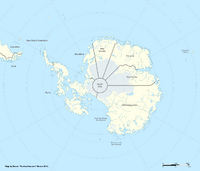| The following Great White South page is under construction.
Please do not edit or alter this article in any way while this template is active. All unauthorized edits may be reverted on the admin's discretion. Propose any changes to the talk page. |
|
Africa · Antarctica · Asia · Australia and the Pacific · Europe · North America · South America |
Antarctica (occasionally known as Bellinsgauzenia, Terra Australis, Terra Incognita or Australia, though the latter term is extremely uncommon) is the southernmost and fifth-largest of the Earth's continents. It was the last major landmass to be discovered by humans, and was first inhabited around 10,000 BCE, by Fuegian and Tehuelche peoples who arrived via South America. Due to its extreme southerly location — it is the site of the southern geographic and geomagnetic poles — Antarctica has the coldest average climate of any of Earth's continents, though much of the coastline, especially in the east, is much more temperate. A permanent icecap exists in the region immediately surrounding the geographic south pole, which grows each Summer (the colder season in the Southern Hemisphere) to encompass a larger portion of the continent.
Historically, Antarctica's climate was much colder — even colder than its northern counterpart, the Arctic Ocean — until around 20,000 BCE, when it began to warm rapidly. The reason for this "meltdown" is still unknown, though many geologists and climatologists have put forward various hypotheses about its nature. The continent's indigenous population arrived roughly 10,000 years after the meltdown, via Patagonia and Tierra del Fuego in South America, and established various hunting, herding and fishing societies — most notably the Kingdom of K'athar (founded c.900 CE), which was a major civilization for centuries. After millennia of isolation, except for occasional trade with South American and Polynesian peoples, the continent was discovered by Russian explorer Fabian Gottlieb von Bellingshausen in 1820; immediately opening Antarctica to colonization by foreign powers.
The Russian and British Empires soon began to dominate the continent, and it was fully colonized by the turn of the 20th Century. Antarctica was the site of significant conflict during both World Wars, and was also heavily affected by the Russian Civil War due to the vast Russian influence over the continent. It was largely bypassed by the direct effects of the Cold War due to a lack of major Communist support; and it entered the 21st Century as one of the most developed regions on Earth. Among Antarctic nations, New Devon consistently ranks among the world's most livable countries; Byrdia has been called "the most enlightened nation on Earth in terms of Civil Rights"; and Bellinsgauzenia has been one of the world's military, industrial and technological powers for decades.
Etymology[]

A 1583 French map hypothesizing "Terre Australie".
The term "Antarctica" refers to the continent's status as the polar region surrounding the south pole. The prefix "anti-", meaning "opposite" was added to "Arctic", the name of the northern polar region; creating an appropriate term for the austral continent. The term "Arctic" comes from the Ancient Greek "arktos", meaning "bear".
On pre-1820 maps, when cartographers could only speculate about Antarctica's existence, the hypothetical landmass was termed "Terra Incognita" ("Unknown Land") or "Terra Australis" ("Southern Land").
"Bellinsgauzenia" was an early name for the continent, named for its discoverer, the Russian explorer Fabian Gottlieb von Bellingshausen. It was especially popular in Russia, as it emphasized the Russian discovery of the continent; but the term fell into disuse when the country of Bellinsgauzenia was founded in 1926. It is still occasionally used today to refer to the entire continent, though its use continues to decline.
"Australia" referring to the continent's austral (southern) location is an exceptionally rare name for the continent. This is because the term had already been applied to another southerly continent.
Geography and Climate[]
History[]
- Main articles: History of Antarctica, Timeline of Antarctic History
Prehistory[]
Indigenous societies[]
- See also: Indigenous Peoples of Antarctica
Colonial era[]

Fabian Gottlieb von Bellingshausen, the first European on Antarctica.
- See also: Colonization of Antarctica
National era[]
World Wars[]
- Main articles: Antarctica in World War I, Antarctica in World War II
Modern history[]
Culture[]
Visual Art[]
Cinema and Television[]
Theater[]
Literature[]

T. X. Thompson's poetry is considered quintessentially "Antarctic" in its style.
- See also: Club Antarctique
Indigenous Culture[]
Politics[]
Geopolitics[]
- See also: Countries and territories of Antarctica
Much like Africa, Australasia and the Americas (and to a lesser extent, Asia); Antarctica's geopolitics are heavily influenced by the continent's colonial history. Due to Russia's dominance of the southern half of the continent, the Russian Civil War also had a significant impact on Antarctic geopolitics, as did the Og movement for a singular indigenous Antarctic nation and the scientific and political significance of the South Pole.
National politics[]
Continental politics[]
Demographics[]
Race and ethnicity[]
Language[]
- Main article: Languages of Antarctica

